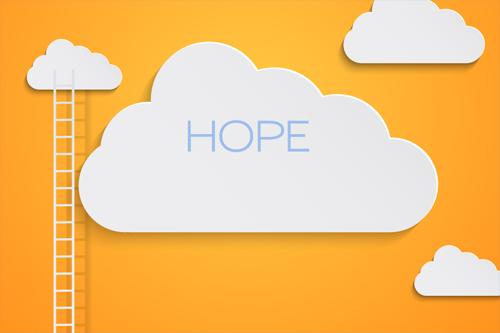You want something—maybe it’s a car, a job, a dream vacation, the end of an illness, the start of a relationship, Whatever it is, you set your sights on it and then…as the Stones so eloquently said, “You can’t always get what you want.” But will you be satisfied to only get what you need?
In a life where free will offers us the opportunity to create the world we wish to live in, most of us know that actually getting what we want depends on our own actions. We begin with clarity, put in place a strategy, execute a plan, and await the results—which don’t always materialize.
In those moments when everything goes wrong, how do we keep the dream alive? By fanning the flames of expected success, plus desiring to have that thing that means so much.
In other words, it’s important to foster hope.
According to Maryann Makekau, founder of Hope Matters, an organization in Destin, Florida, dedicated to inspiring hope in people dealing with critical difficulties: “Hope is the most essential tool in any journey. It’s an anchor that gets you through the tough, dark times, and an opportunity to nurture and celebrate one another when we’re going through challenges.”
Technically, hope is an anticipatory feeling. It is also the beginning of any success, the small voice that says, “I believe things can be different.” The hard part about hope is that it’s an action-oriented resource that you have to manufacture internally. You can’t buy it (although you can borrow it, by believing in the hope someone else harbors), and you can’t depend on someone else to give it to you. Hope, as Makekau explains, is a decision.
On a down day, how can you find that resolve against all odds? Here are some practical ways:
Choose to find hopeful moments, experiences, or instances. Studies have proven that what we see isn’t necessarily what exists; what exists is what we see. The world organizes itself through your perspective. Deciding to perceive through a veil of hope (in even the smallest detail) develops an optimistic attitude that shapes your experiences throughout the day.
Offer hope to others who need it as a way to practice developing it in yourself. Much like compassion, hope is sometimes easier to give than receive. If you find it difficult to have hope for your own life, offer hope to someone else. Expecting and desiring for others subconsciously models how to be hopeful for yourself.
Be flexible and open to change. Hope can be squashed if your preconceived notion is that there is only one way for you to receive what you want. Practicing flexibility strengthens optimism, as your mind learns that while events don’t always happen the way you expect, your goals can still happen another way. This allows hope to always exist.
Think small. While it’s great to see the big picture, it can be overwhelming. Hoping for small, incremental events that will lead up to the big result actually promotes more hands-on hope in the long run. Every small success wires your brain for a future success, which establishes a sort of hope relay that keeps up your spirits.
Imagine big. Getting what you want will change your life in many ways. You will hear, think, see, smell, taste, dress, talk, walk, etc., differently due to even the tiniest success in any area. The more you close your eyes and imagine these changes, the more your brain primes to the hope—and creation—of these specific outcomes and collaborates with you to bring them into existence.
Doubt, like a shadow, can creep in just about anywhere. Lack of patience, negative input from others, and low self-esteem all contribute to unsettled feelings. In those moments, Makekau suggests that you “demonstrate, understand, and communicate your doubt. Give a voice to worry; if you don’t, it will suffocate hope.”
Speaking out about doubt may actually reverse-engineer hope: Sharing your uncertainty can inspire those around you to supply fresh ideas, thoughts, and scenarios that make hope more tangible. Plus, tapping into community can alleviate loneliness during a stressful time. Feeling connected renews energy, stimulating your own creativity so that hope can become not only a decision but an expression of your problem-solving self.




1 Comment
Mike Good
Thank you for helping me better understand the importance of hope. I hadn’t really thought much about until I started wanting to help families with Alzheimer’s maintain hope. I can see how doubt would squash hope, but being around others who have found ways to cope with the disease would help hope grow.